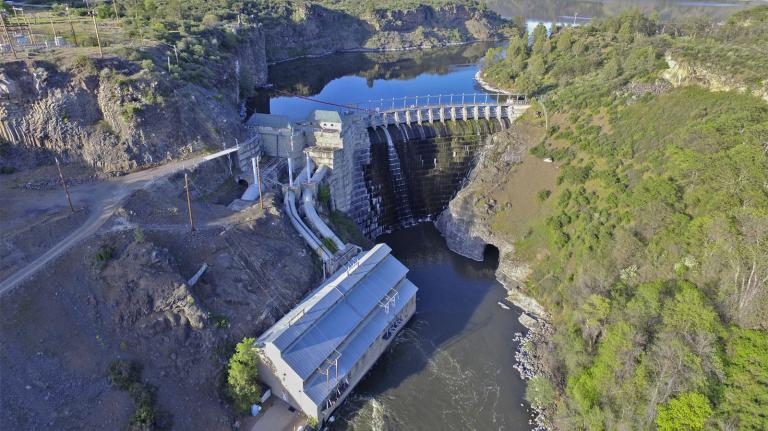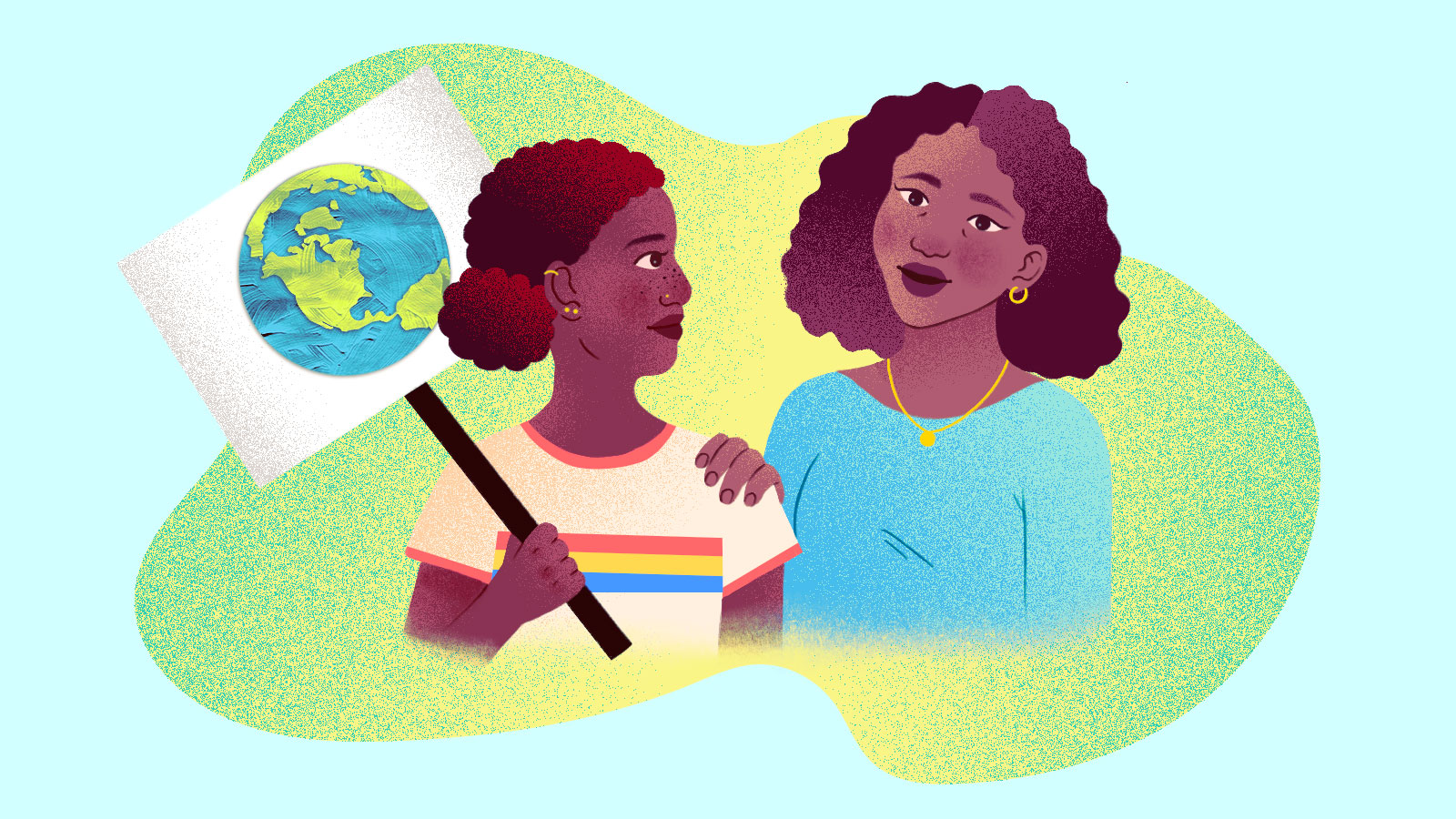Kids want to trust that grown-ups have a plan. But when it comes to climate change, adults have left the next generation with more questions than answers.
Growing up, I thought my parents knew what to do about everything, including caring for the environment. It was the early ’90s, and most environmental campaigns were focused on individual behaviors; our family engaged in small actions — cleaning up parks, recycling, carpooling — hoping to make a difference. But these solutions obviously were not enough to compensate for the government’s failure to act boldly and swiftly on the issue.
Now, more than 30 years later, the critical moment is upon us to confront global climate change. Who is saving the day? Our own kids.
Greta Thunberg. Alexandria Villaseñor. Autumn Peltier. Xiye Bastida. These are some of the young climate leaders who are pushing hard for environmental action. Instead of enjoying carefree childhood hobbies, they are protesting, litigating, organizing, and public speaking about the importance of policy-based climate solutions. Those efforts are courageous and inspirational, but teens’ superhero-worthy feats do not absolve the rest of us. Kids need parents to engage, too.
As a psychotherapist working with teens, I see firsthand the need for parents to share the burden of climate responsibility. Some parents are unintentionally dismissive, minimizing, or belittling of their kids’ environmental concerns: Don’t worry so much. You’re too young to think about these things. Go do something fun and take your mind off it. These responses are often rooted in parents’ own triggered and disregarded emotions. Other adults are silent on the issue, either because it feels too hard or too unpleasant to discuss. Dr. Renee Lertzman, a climate engagement strategist, uses the term disavowal to describe this behavior: We know the climate crisis is happening, but choose to ignore or turn away, focusing elsewhere.
Climate disavowal was already happening in pre-pandemic life, but the additional stressors associated with our country’s present situation — joblessness, food insecurity, political conflict, pandemic health concerns, social isolation — make it even harder to think about environmental responsibilities. Psychology helps explain this gap between climate awareness, concern, and engagement. People have a tendency to prioritize immediate concerns over long-term considerations; survival depends on responding to perceived imminent threats. Climate change, though a clear peril, remains on the brain’s back burner.’ Many American parents are overwhelmed by responsibilities, and under-resourced, and there is little bandwidth to tack on one more thing at the end of the day.
But climate can’t stay on the back burner forever. Dr. John Fraser, a conservation psychologist and CEO of New York-based think tank Knology, points out that climate trauma “builds over time” with “the sense that the earth is abandoning us.” Meanwhile, young people are asking adults to engage with them on environmental issues. When a parent is avoidant or uncomfortable, it only makes kids worry more.
“Children and young people tell me that their anxiety is severe,” wrote Carol Hickman, a climate psychology researcher at the University of Bath in a recently published paper. These feelings worsen if parents “fail to understand why and how their worries about the climate and biodiversity crisis can affect them daily, constantly.”
In other words, how adults respond to youth matters. Our job isn’t to overprotect, scare, stigmatize, or sugarcoat, but to listen to kids’ real and valid concerns and then talk about them together. Only then can kids and adults work together toward finding a solution. That intergenerational collaboration is key. When kids believe adults are trusted allies, they can carry less of the emotional burden of climate change. Jill Kubit, Co-Founder of Our Kids’ Climate, an international organization amplifying parent voices on this issue, says youths are “asking for adults to act, and to make changes and decisions, and we have the power to do that.”
Kids need parents to act in order to reach the critical mass needed for climate action. That’s something Buddhist scholar and environmental activist Joanna Macy has described as “the Great Turning,” the profound socio-political shift away from “business as usual.” Only when ideas and behaviors become contagious, she says, will we be able to tip the scales.
But we have a ways to go before we reach that turning point; the Yale Program on Climate Change Communications reported in 2020 that even though 66 percent of Americans are at least “somewhat worried” about global warming, roughly the same percent said they “rarely” or “never” discuss it with friends or family. The climate crisis is already here, but many of us still find it, too daunting to think about.
But just because you don’t want to talk with your kids about climate change doesn’t make you immune to its effects. As a mother of two children living in California, I’ve long known that climate change was behind many of the changes visible from my own doorstep — hotter summers, drier winters, and longer periods of drought. Even so, I tended to ignore the threat — that is, until wildfires scorched the landscape around us for each of the last four years. Dealing with orange skies and ash-filled air upended ordinary life, demanding additional mental exertion. It finally forced me to face my own climate anxiety and grief.
There was one particular day when it all seemed to hit me at once. I had just dropped my kids at school when I caught Greta Thurnberg, then 16, speaking on the radio. She was addressing the adult members of the 2019 U.N. Climate Change Summit, her voice shaking with anger.
“I should be in school right now!”
“How dare you!”
“Shame on you!”
Her words seemed to puncture my chest, like an emotional heart attack. When I got home, I trudged from car to house, zombie-like. Instead of getting dressed for work, I curled up into a couch pretzel and wept.
In my tears, I tasted my own bitter childhood naivete, grief, shame, anger, and sorrow. I realized that somewhere in the transition between my idealistic youth and my pragmatic parenthood, I’d abandoned my commitment to climate action. As co-leader of my high school Environmental Club, I’d participated in a panel interview on local TV with longtime environmental advocate Jane Goodall. I remember her saying, “The greatest danger to our future is apathy.” But it took the voice of a Swedish teenager to rouse me from the adult slumber of my climate disavowal.
Leslie Davenport, psychotherapist and author of Emotional Resiliency in the Era of Climate Change, advises making time for difficult emotions and “not just rushing to find the ‘happy’ feelings.” She says ignoring climate change feelings is like trying to hold a ball underwater with one hand. Instead, she recommends people should strive for a climate-specific kind of emotional resilience, increasing our capacity “to remain present and engaged as we bear witness to growing distress in ourselves, others, and the world.”
For parents, our choice is simple: wake up to climate change or risk dying in our sleep. The former choice requires us to acknowledge our ambivalence about reducing our carbon footprint. We must ask ourselves tough questions: Why is changing our habits, comforts, and the way we live so hard? How can we hold elected officials accountable in light of the climate task at hand? What sacrifices and compromises must we make to avoid the worst impacts of climate change?
There are many ways for parents to step up. We can offset disturbing news with inspiring stories, affirmations, and creative acts to bolster our families for the climate long-haul: Listen to the poem Earthrise by Youth Poet Laureate Amanda Gorman with your kids; get inspired by the story of four girls “greening” their school, instead of doomscrolling, seek out stories about promising climate policies, laws, and proposals; reflect on and write down your deepest hopes and fears — something Kubit of Our Kids’ Climate says tends to increase pro-environmental behaviors, motivation, and community engagement.
If you feel lost or overwhelmed, try connecting with others. Look up parent-centric climate organizations like Parents for Future, Climate Mama, Science Moms, Climate Action Families. Join a Carbon Conversation or attend a virtual Climate Café, forums for sharing and hearing what others have to say about the climate crisis. Spending time in those spaces might help you find the words to talk to kids — and other adults! — about our rapidly warming world.
So, hop on the bandwagon, grownups! Now that a new administration is here and open to prioritizing the environment, parents have a chance to join our kids and help shift our country’s values toward a more sustainable future.
Future generations, vulnerable ecosystems, and “fenceline” communities all depend on our ability to act now. As Kubit puts it, “Parents have a unique responsibility because they have someone they love to answer to. Our own kids will hold us accountable.”
Ariella Cook-Shonkoff is a licensed psychotherapist and art therapist based in Berkeley, California. She is co-chair of Communications/ Media at the Climate Psychology Alliance-North America. The views expressed here do not reflect any official organizational opinions or positions at Grist.




